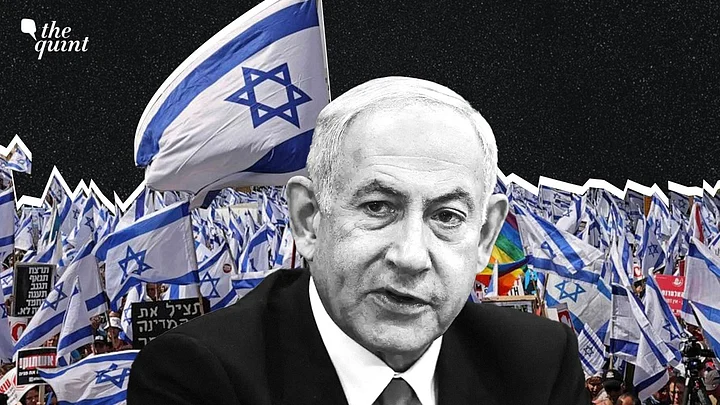Israel’s 9 September airstrike in Doha was not just another episode in its long war with Hamas. It was a thunderclap. Ten Israeli warplanes flew nearly 1,800 kilometres through Arab skies, unleashed a barrage of missiles at a Hamas delegation meeting site in the Qatar's capital, and then turned back home. Six people died, including a Qatari security officer. Hamas’s top brass survived, but the bigger story wasn’t who was hit. It was who looked the other way.
Let’s state the obvious: Israeli jets don’t cruise uninvited through the airspace of Jordan, Syria, Iraq, and Saudi Arabia without someone nodding them along.
This wasn’t a case of radar operators sipping tea and missing a blip on their screens. It was a pre-cleared, pre-negotiated, multinational mission. Reports confirm that British and American refuelling planes were in place east of Qatar, topping off the strike package under United States Central Command (CENTCOM) authority. You don’t pull off a precision raid like this without regional complicity.
And yet, after the dust settled, the Arab world’s response was astonishingly muted. There were condemnations, yes - Saudi Arabia, Egypt, the United Arab Emirates (UAE), Jordan, and the usual chorus spoke of sovereignty and international law. The Arab League and GCC issued their boilerplate statements. But the outrage was perfunctory. No emergency summit. No ambassadors withdrawn. No threats of oil embargoes or diplomatic freezes. Just words, thin as desert air.
Why? Because many Arab leaders are done with Hamas.
Arab World Done with Hamas
The truth is, Hamas has become a regional embarrassment. For decades, Arab capitals tolerated the movement as a symbol of resistance, a thorn in Israel’s side, and a rallying cry for the “Palestinian cause.” But the costs have outweighed the symbolism.
Hamas’ endless militancy has dragged Gaza into ruin, derailed countless peace efforts, and complicated the very normalisation deals that Gulf leaders see as their ticket to economic modernity and global respectability.
Even before the Doha strike, the writing was on the wall. In July, Qatar, Saudi Arabia, and Egypt openly called for Hamas to disarm and surrender Gaza to the Palestinian Authority. That wasn’t idle talk - it was a signal. Hamas had worn out its welcome.
Qatar now finds itself in the most humiliating position. As Hamas’s patron and mediator, it should have been shielded by the very role it carved out for itself: indispensable broker of ceasefires.
Instead, Israeli missiles landed in its capital, during negotiations it was hosting, killing its own officer. Doha’s prime minister thundered about “state terrorism” and complained that Washington gave him just ten minutes’ warning. But he also vowed that Qatar’s mediation role would continue. Outrage, yes - but tightly leashed.
The other Arab states were even more restrained. Their silence speaks volumes. By allowing Israeli jets to traverse their airspace, or at least by declining to scramble fighters to intercept them, they essentially told Hamas: don’t expect us to shield you anymore.
Tectonic Geopolitics
This marks a profound shift. Once, an Israeli strike in an Arab capital would have triggered days of rage, emergency Arab League meetings, and fiery declarations about defending the Palestinian cause. Today, Hamas gets a shrug. The regional calculation has changed. Israel may be hated, but Hamas is no longer loved.
And let’s not ignore the darker possibility: that Arab governments were not merely passive, but active participants in the raid. With CENTCOM refuelling planes in the skies, and corridors pre-cleared, it’s hard to see how this mission wasn’t greenlit - directly or tacitly - by the very states now pretending to be scandalised. If so, then the Arab silence isn’t cowardice. It’s complicity.
The precedent is chilling. Warzone rules have now been exported into foreign capitals. If Israel, with US and Arab acquiescence, can hit Hamas in Doha today, what stops it - or others - from doing the same in Beirut, Amman, or even Tehran tomorrow? The line between battlefield and capital city has blurred, and the Arab states, by their silence, have accepted it.
Hamas, of course, will howl about betrayal. But the louder truth is that Arab leaders are tired of being hostage to Hamas’s agenda. They want a Palestinian state run by pragmatists, not militants; they want economic growth, trade, and global investment, not perpetual war.
In that sense, Israel may have just done them a favour - delivering a blow they themselves no longer had the appetite to resist.
Between the Missiles
The Doha strike was more than a military operation. It was a message - to Hamas, that its Arab cover is gone; to Qatar, that its mediating role comes with no guarantees; and to the rest of the region, that the old game of reflexive solidarity with “the resistance” is over.
The silence from other Arab states may prove louder than any condemnation. It tells Hamas that its support is dwindling, and it tells Israel that the Arab world is less inclined than ever to risk its strategic realignments for the sake of a movement many leaders privately see as a spent force.
(Akhil Bakshi, is an author, explorer and a Fellow of the Royal Geographical Society and Explorers Club USA. He also the Editor of ‘Indian Mountaineer’ and founder of Bharatiya Yuva Shakti. He tweets @AkhilBakshi1. This is an opinion piece, and the views expressed above are the author’s own. The Quint neither endorses nor is responsible for the same.)
